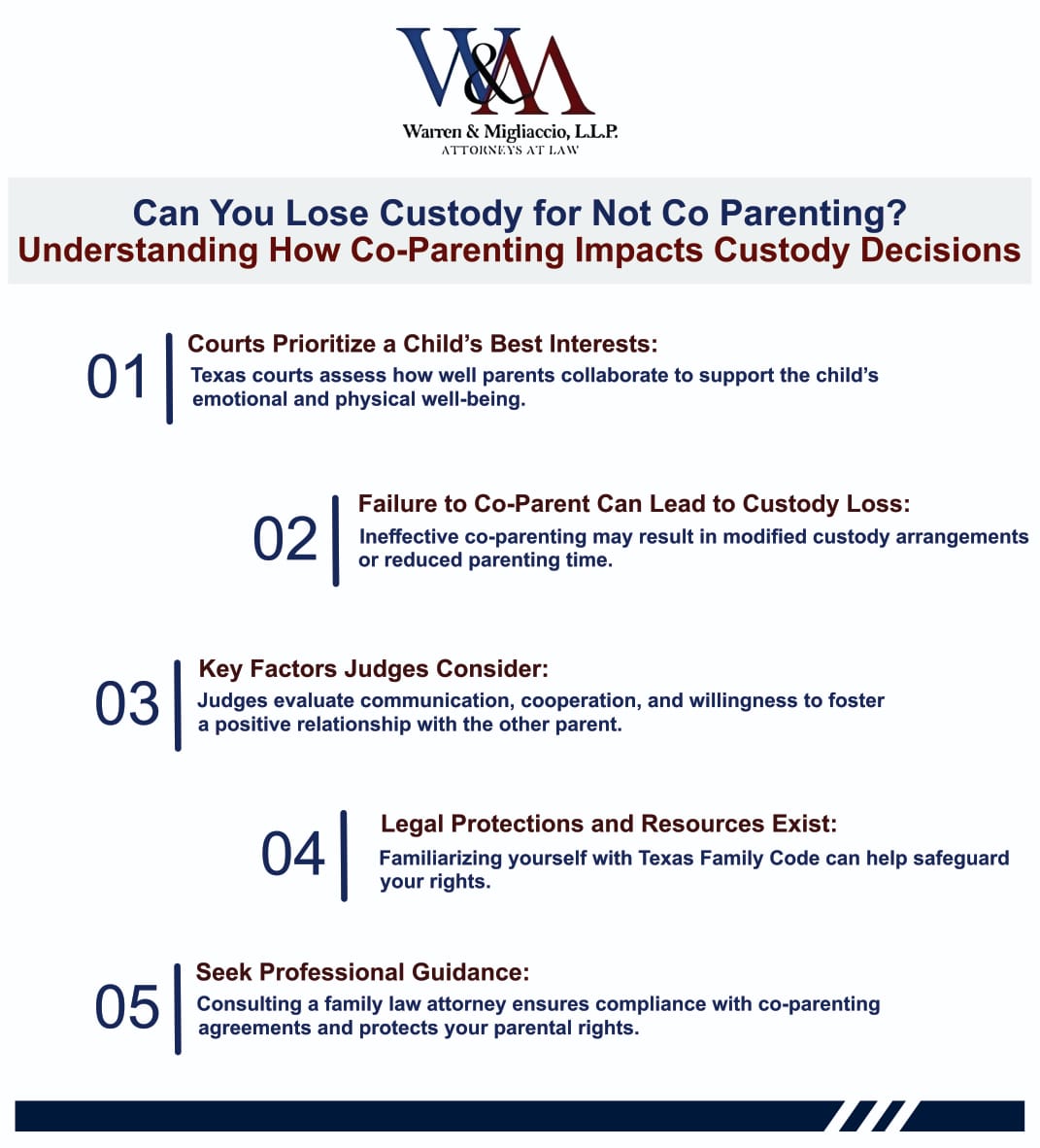Divorce or separation is tough, and figuring out custody is even tougher. Co-parenting after a split is vital for your kids, but it’s hard. Many parents wonder, can you lose custody for not co parenting? The answer is yes. Courts put a child’s best interests first and a parent’s ability to have a healthy relationship with the other parent is a big factor in custody.
Consulting a family law attorney can provide valuable guidance on how to navigate custody issues and ensure compliance with co-parenting agreements.
Key Points:
Importance of Co-Parenting:
Co-parenting is vital for your child’s welfare.
It helps create a stable and supportive environment.
Risks of Not Co-Parenting:
You can lose custody if you fail to co-parent effectively.
Courts look at how well parents work together for the child’s well-being.
Legal Insights:
Texas Family Code and family courts provide guidance on custody issues.
Understanding these laws can help protect your parental rights.
This article will discuss the consequences of bad co-parenting and how to avoid losing custody because of these. We’ll use Texas Family Code and family court examples to help you understand the legal risks and protect your parental rights.

Understanding Co-Parenting and Its Importance
Co-parenting means sharing the responsibility of raising kids after a separation or divorce. It involves:
Making joint decisions about the child’s upbringing, like education and healthcare.
Providing emotional support and stability for the child.
Creating a nurturing environment where the child can thrive despite the parents’ separation.
Effective co-parenting is crucial for minimizing disruptions in the child’s life and ensuring they have a stable and supportive environment.
Here’s why co-parenting is important:
Cooperative parents are favored in child custody cases.
Your co-parenting actions directly influence your custody rights.
Maintaining a healthy co-parenting relationship helps follow court orders and protect your rights in custody arrangements.
Remember, effective co-parenting is about working together for the child’s welfare and ensuring a stable and supportive environment.
Legal Custody vs. Physical Custody
It’s important to know the difference between legal custody and physical custody:
Legal custody means the right to make big decisions about the child’s upbringing, like education, medical care and religious upbringing.
Physical custody means where the child lives.
Texas courts often favor joint custody where both parents have legal and/or physical custody. But the court can grant sole custody to one parent if it’s in the child’s best interest.

Joint Custody vs. Sole Custody
Joint custody requires communication and cooperation between parents. Both parents can be actively involved in the child’s life which is good for the child’s emotional well-being and development. But joint custody can be tough if parents can’t communicate or cooperate.
Sole custody is granted when one parent is deemed unfit or poses a risk to the child’s safety. This can be domestic violence, substance abuse or child abuse. While sole custody may be necessary to protect the child, it can also limit the child’s relationship with the other parent.
Can You Lose Custody for Not Co-Parenting Effectively?
Yes, ineffective co-parenting can jeopardize your custody rights. Texas courts prioritize a child’s well-being and strive to foster an environment with consistent, positive parental engagement. If a parent isn’t co-parenting effectively, the court may modify existing custody orders, potentially reducing parenting time or even transferring primary custody to the other parent.
When a parent fails to cooperate or fulfill their role in the parenting plan, it can lead to modifications in custody arrangements.
What Family Court Judges Look At
When evaluating co-parenting, judges consider:
Consistent involvement in the child’s upbringing: This means being actively involved in the child’s daily life, attending school events and being involved in their medical care.
Willingness to let the other parent have a relationship with the child: This means supporting the child’s relationship with the other parent and not doing anything to harm that relationship.
Communication and cooperation: This means being able to communicate openly and respectfully with the other parent about the child’s needs and making joint decisions for the child.
Judges also look at a parent’s ability to provide a stable and supportive environment which can be affected by substance abuse and co-parenting dynamic.
Common Issues in Co-Parenting
Several issues can hinder successful co-parenting:
Blocking or undermining the child’s relationship with the other parent:
This includes interfering with visitation and making negative comments about the other parent in front of the child. Likewise, trying to turn the child against them.
Substance abuse:
Using drugs or alcohol at home can create an unsafe and unstable environment, which can affect custody decisions.
Domestic violence:
Domestic violence is a serious issue that can impact custody cases. Courts focus on protecting the child and any victimized parent.
Poor communication:
Refusing to discuss issues, withholding information, or behaving in a hostile way can harm co-parenting.
It’s also important to know that custody decisions are not based on gender. A mother can lose custody if her actions do not align with the child’s best interests.

How Not Co-Parenting Affects Custody?
Courts want both parents to be involved in the child’s life. However, some parental behaviors can hurt custody. In some cases, child custody evaluations may be ordered to evaluate each parent’s capabilities and overall impact on the child’s well-being. Here are some co-parenting failures that can hurt your custody rights:
Disrupting the Other Parent’s Time
Interrupting the parenting schedule, being late for pickups or drop-offs, or denying the other parent their court-ordered time can lead to custody changes.
Poor Communication
Respectful and open communication is essential for co-parenting. Failing to discuss important child-related issues is not in the child’s best interest and may influence custody decisions.
Making Decisions Without Agreement
If you have joint legal custody, making big decisions about your child’s education, healthcare, or other important matters without consulting the other parent can result in a review of your decision-making rights.
Speaking Negatively About the Other Parent
Badmouthing the other parent in front of the child or encouraging disrespect can harm the child emotionally. Courts view this as parental alienation, which can affect your custody case.
Refusing to Be Flexible
While following the parenting plan is important, being too rigid or refusing reasonable changes can reflect poorly on you. Flexibility and cooperation are key to effective co-parenting.
Legal Consequences of Poor Co-Parenting
Consistent failure to co-parent effectively can result in several court actions as outlined by Texas Family Law Code:
Modifying existing custody arrangements: If one parent often fails to allow visitation or hurts the child’s relationship with the other parent, the court might change custody arrangements.
Reducing parenting time: The court may give more visitation rights to the parent who follows the rules and shorten time for other parent who is not following the rules.
Imposing supervised visitation: Repeated violations can lead to stricter measures, like supervised visitation or even losing custody.
Contempt of Court: A parent who doesn’t comply might be held in contempt of court.
Ordering co-parenting classes or counseling: The court may order parents to attend classes or counseling to help them learn how to co-parent effectively and put the child’s needs first. This is often seen as a way to improve communication and cooperation between parents.
In extreme cases, transferring primary custody to the other parent: If one parent consistently demonstrates an inability or unwillingness to co-parent, the court may decide it’s in the child’s best interest to transfer primary custody to the other parent. This is usually a last resort, but it can happen if the court believes the child’s physical or emotional well-being is at
Loss of custody due to poor co-parenting isn’t immediate. Courts typically provide opportunities for parents to improve their behavior before making significant custody changes. However, if a parent consistently fails to address these issues, it can jeopardize their custody rights.

Tips for Effective Co-Parenting
To avoid loss of custody due to poor co-parenting, follow these tips:
Do:
Communicate respectfully.
Stick to the parenting schedule.
Be flexible when possible.
Focus on your child’s needs.
Seek professional help if needed.
Don’t:
Use your child as a messenger.
Speak negatively about the other parent.
Make unilateral decisions.
Use your child as a pawn.
Refuse to compromise.
When Co-Parenting Becomes Impossible
Sometimes, co-parenting may seem impossible despite your best efforts due to the other parent’s actions. If this happens, document all instances of non-cooperation and seek legal advice. Consider alternatives like parallel parenting, which minimizes direct contact while still sharing parental responsibility.
For serious challenges like child neglect, emotional abuse, sexual abuse, or child abduction, consult a child custody lawyer or divorce lawyer for guidance and protection of your custody rights. They can help you navigate complex custody battles and understand your legal options.
Frequently Asked Questions
Co-Parenting Challenges
What happens when parents can’t co-parent?
When parents fail to co-parent, it creates conflict and stress for children. Courts may order co-parenting classes, mediation, or restricted contact for the uncooperative parent. In severe cases, judges may modify custody orders to protect the child’s best interests.
What is harassment by a co-parent?
Harassment includes excessive communication, threats, intimidation, and hostile behavior. Examples: constant criticism, false accusations, or using the child as a messenger. This behavior may impact custody and could result in legal consequences, such as contempt of court.
What do I do when my ex won’t co-parent?
- Keep written records of communication
- Track violations of the parenting plan
- Seek mediation or legal advice
- File a motion with the court if necessary
Courts can enforce parenting plans or modify custody to protect the child.
Custody Rules in Texas
What are the rules for child custody in Texas?
Texas custody decisions always focus on the best interests of the child. Courts consider:
- Each parent’s caregiving ability
- The child’s relationship with each parent
- Any history of abuse, neglect, or substance abuse
Texas favors joint custody if it benefits the child. But courts may grant sole custody if joint arrangements don’t serve the child’s best interests.
Is there a law about co-parenting in Texas?
Texas law doesn’t require “co-parenting” by name, but it strongly influences custody and visitation. The Texas Family Code emphasizes:
- Best Interests of the Child – Both parents should remain involved.
- Parenting Plans – Parents are encouraged to create detailed plans for decision-making and child-rearing.
- Legal Consequences – Courts can modify custody if one parent repeatedly undermines the other or prevents contact.
In extreme cases, a parent may lose custody for consistently refusing to cooperate, since courts prioritize providing the child with a stable and supportive environment.
Conclusion
Can you lose custody for not co parenting? Yes. Courts put the child’s best interests first, and a parent’s refusal or failure to co-parent can lead to custody changes. While losing custody is a last resort, courts will act to protect the child’s well-being if needed.
Good co-parenting means focusing on your child’s needs. Communicate openly, respect the other parent’s role, and work together to create a positive and stable environment. If co-parenting feels too hard or you’re facing custody challenges, getting legal advice is important.
At Warren & Migliaccio, LLP, our child custody attorneys can guide you through custody issues and help you protect your parental rights. Call us at (888) 584-9614 or contact us online to start moving forward.

